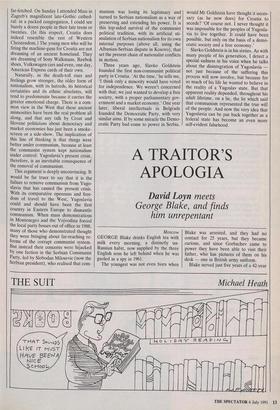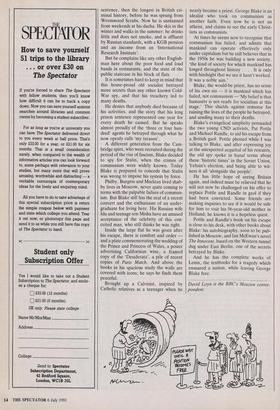A TRAITOR'S APOLOGIA
David Loyn meets
George Blake, and finds him unrepentant
Mosco w GEORGE Blake drinks English tea with milk every morning, a distinctly un- Russian habit, now supplied by the three English sons he left behind when he was gaoled as a spy in 1961.
The youngest was not even born when Blake was arrested, and they had no contact for 25 years, but they became curious, and since Gorbachev came to power they have been able to visit their father, who has pictures of them on his desk — one in British army uniform.
Blake served just five years of a 42-year sentence, then the longest in British cri- minal history, before he was sprung from Wormwood Scrubs. Now he is suntanned from weekends at his dacha. He skis in the winter and walks in the summer; he drinks little and does not smoke, and is affluent by Russian standards, with a KGB pension and an income from an 'International Research Institute'.
But he complains like any other English- man here about the poor food and loud bands in restaurants, and the state of the public staircase in his block of flats.
It is sometimes hard to keep in mind that this house-proud old socialist betrayed more secrets than any other known Cold- War spy, and that his treachery led to many deaths.
He denies that anybody died because of his activities, and the story that his long prison sentence represented one year for every death he caused. But he speaks almost proudly of the 'three or four hun- dred' agents he betrayed through what he now openly calls 'my treason'.
A different generation from the Cam- bridge spies, who were recruited during the period of the rise of fascism, Blake decided to spy for Stalin, when the crimes of communism were widely known. Today Blake is prepared to concede that Stalin was wrong to impose his system by force.
Philby, Burgess and Maclean lived shab- by lives in Moscow, never quite coming to terms with the palpable failure of commun- ism. But Blake still has the zeal of a recent convert and the enthusiasm of an under- graduate for living here. His Russian wife Ida and teenage son Misha have an amused acceptance of the celebrity of this con- ceited man, who still thinks he was right.
Inside the large flat he was given after his escape, there is comfort and order and a plate commemorating the wedding of the Prince and Princess of Wales, a poster advertising Californian wine, a framed copy of the 'Desiderata', a pile of recent copies of Paris Match. And above the books in his spacious study the walls are covered with icons; he says he finds them peaceful.
Brought up a Calvinist, inspired by Catholic relatives as a teenager when he nearly became a priest, George Blake is an idealist who took on communism as another faith. Even now he is not an atheist, and claims to see the early Christ- ians as communists.
At times he seems now to recognise that communism has failed, and admits that mankind can- operate effectively only under capitalism but he still believes that in the 1950s he was building a new society, `the kind of society for which mankind has longed throughout history . . . . It is only with hindsight that we see it hasn't worked. It was a noble aim.'
Blake, the would-be priest, has no sense, of his own sin — it is mankind which has failed, not communism — 'My belief is that humanity is not ready for socialism at this stage.' This shields against remorse for ruining the lives of the people he betrayed, and sending many to their deaths.
Blake's evangelical simplicity persuaded the two young CND activists, Pat Pottle and Michael Randle, to aid his escape from a, British gaol. Pottle phoned while I was talking to Blake, and after expressing joy at the unexpected acquittal of his rescuers, the old spy spoke in banal terms about these 'historic times' in the Soviet Union, Yeltsin's election, and being able to wit- ness it all 'alongside the people'.
He has little hope of seeing Britain again, and indeed must be relieved that he will not now be challenged on his offer to replace Pottle and Randle in gaol if they had been convicted. Some friends are making inquiries to see if it would be safe for him to visit his 96-year-old mother in Holland; he knows it is a hopeless quest.
Pottle and Randle's book on his escape is close to his desk, with other books about Blake: his autobiography, soon to be pub- lished in Moscow, and Ian McEwan's novel The Innocent, based on the Western tunnel dug under East Berlin, one of the secrets betrayed by Blake.
And he has the complete works of Lenin, the textbooks for a tragedy which ensnared a nation, while leaving George Blake free.
David Loyn is the BBC's Moscow corres- pondent



















































 Previous page
Previous page